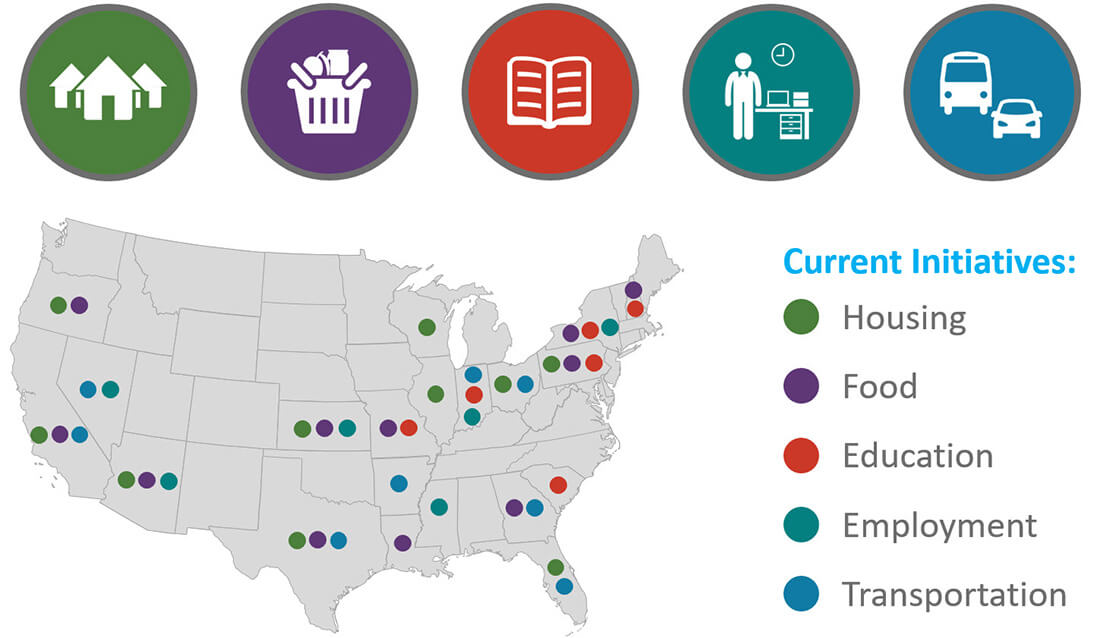Social Determinants of Health
Creating Health Equity
Many factors contribute to an individual’s health and wellness beyond access to medical care. Socioeconomic conditions can influence health risks and outcomes. Poverty, food insecurity, housing instability, education, employment, access to transportation and other circumstances contribute to health disparities among underserved and vulnerable populations.
Nationwide Initiatives
Centene is a leader in providing affordable, high-quality healthcare services, and we’re continually enhancing our robust efforts to address social determinants of health. The company’s long history of identifying and removing barriers to health is present in states where we operate health plans.
Initiatives marked on the national map below highlight some of the promising practices and partnerships that are improving outcomes.

Georgia: Our Georgia subsidiary, Peach State Health Plan, partnered with Habitat for Humanity to build four new homes over the past three years. Access to safe and affordable housing is one of the most important social determinants of health. When families lack stable housing, quality of life is more likely to be compromised.
Arizona: Arizona Complete Health, Centene's Arizona subsidiary, has case management teams directly integrated with the statewide Homeless Management Information System, allowing for the quick identification of housing and services for homeless individuals and families, as well as persons at risk of homelessness. The health plan has also implemented a centralized referral process which prioritizes available state funding for housing according to medical risk/necessity. The overall number of homeless members decreased by 20% between July 2016 and June 2017.
Oregon: Data from our Oregon subsidiary, Trillium Community Health Plan, demonstrated significant cost savings as a result of supportive housing placement. Overall healthcare costs decreased by 53%, ED utilization decreased by 26%, inpatient hospital stays decreased by 55%, and behavioral health utilization decreased by 14%.
Kansas: Our Kansas subsidiary, Sunflower Health Plan, sponsored the Double Up Food Bucks Program in 2018, giving up to $25 to farmers' market attendees who spent $25 on SNAP-eligible items at the market. The extra dollars can then be spent on fruits and vegetables to encourage healthy eating habits and to help shrink food deserts.
Georgia: Peach State Health Plan participated in the Shared Meal Program and hosted several events throughout the state. Distributing turkeys and other food supplies helps fight hunger in the community.
Indiana: Our Indiana subsidiary, Managed Health Services (MHS), partnered with Indy Reads to support members with low literacy and encourage literacy training courses. Indy Reads classes will count toward the new Gateway to Work requirement.
Arizona: Arizona Complete Health helps members address kindergarten readiness by offering The Read It and Eat It Program provided by Native Health. This program has been offered to members since January 2016 and provides early literacy activities in collaboration with the Phoenix Public Library. Nutrition education and cost-conscious, seasonal cooking demonstrations are also offered to help families combat childhood obesity.
California: Centene's California subsidiary, Health Net, partnered with GoNoodle to help teachers get kids moving in the classroom with short bursts of interactive movement. This partnership brings more physical activity into elementary classrooms in the Los Angeles Unified School District. The students at Camino Nuevo Charter Academy in Los Angeles recently participated in GoNoodle’s program with 3-5 minute videos and games that include running, jumping, dancing, and stretching inside the classroom. The partnership has been proven to improve behavior, focus, and academic performance while bettering classroom culture, class cohesion, and mental and physical health.
Mississippi: Our Mississippi subsidiary, Magnolia Health, developed the Magnolia Works program to assist members with education, training, and employment needs. The program helps members earn a GED or high school diploma, prepare for job interviews, enroll in money management classes, or train for a new job. A social service specialist stays in touch with each member throughout the process to help them stay on track and achieve their goals.
Kansas: Sunflower Health Plan, Centene's Kansas subsidiary, connects members with a benefits specialist who helps them understand how to access community job fairs, GED vouchers, referrals, and assistance with career counseling services. STEP is a workforce development and employment support program designed to identify and remove employment barriers by connecting members to existing community resources. The framework of STEP will be implemented throughout the state, partnering with community organizations to provide opportunities for our members to further their education and pursue meaningful employment. STEP also allows Sunflower Health Plan to identify members who meet the qualifications of the Kansas WORK and Working Healthy programs.
Across several states, including Texas, Indiana, Georgia, Florida, and Ohio, health plans are piloting rideshare programs that provide more than 10,000 members with access to transportation to health activities, work programs and/or literacy classes.
California: In 2017, Health Net, Centene’s California subsidiary, identified disparities in postpartum care among members in Fresno County. Cultural, clinical, and social conditions were creating significant barriers to care. Notably, it was discovered that 80 percent of women with a cultural heritage from Mexico or Latin America countries observed a postpartum period called la cuarantena, or quarantine. By investing in a rideshare program for members, extending the window for postpartum visits, collecting cultural heritage data through direct outreach, and educating members and providers, Health Net was able to increase their postpartum examinations by 30 percent.
Innovation Team
Social determinants of health have gained recognition in recent years, but Centene has acknowledged their impact on health outcomes since our founding. Our Social Determinants of Health Innovation team works closely with health plan and subsidiary leadership to support efforts designed to address social determinants of health across all Centene products and membership. The team addresses barriers to healthcare through transformative pilot programs that test new models of care.
External Partnerships
The Centene Center for Health Transformation™ fosters research collaborations, demonstrates thought leadership, and initiates innovative new programs. The Center aims to advance health solutions to improve lives so that communities can thrive. The partnership leverages academic research expertise and Centene's industry resources to create and implement evidence-based innovations to improve the health outcomes of vulnerable populations across the country.
During the COVID-19 pandemic, Centene partnered with Feeding America® on national initiatives enabling cross-sector collaboration at the local level. The best practice guidelines were developed to improve Supplemental Nutrition Assistance Program (SNAP) application assistance. Additionally, the creation of national guidelines for medically and culturally tailored food boxes helped provide the right nutrition for those suffering from chronic diseases. This work, completed in 2021, ensured better collaboration between Centene health plans and local food banks in the Feeding America network, resulting in improved nutrition and health outcomes while streamlining and enhancing our shared efforts to address food insecurity.
Community Access
Across multiple states, Centene health plans have implemented community-integrated social services technology platforms to connect members with community benefit organizations. The platforms enable real-time information sharing and centralized access to community support systems, helping members access resources for improved health and quality of life.
Buckeye Health Plan, Centene's Ohio subsidiary, participates in the Pathways Community Hub partnership to identify and address barriers to care for vulnerable individuals. By connecting members to community supports and resources via the Hub, Buckeye Health Plan has significantly improved birth outcomes for women most at risk of low birthweight deliveries, reducing NICU admissions.
In California, Health Net launched two community resource centers in East Los Angeles and Sacramento, focusing on educating and connecting community members to essential supports. Open to the public, the community resource centers assist with benefits navigation, facilitate access to health services, list community programs, and host educational workshops and social activities for the community.

